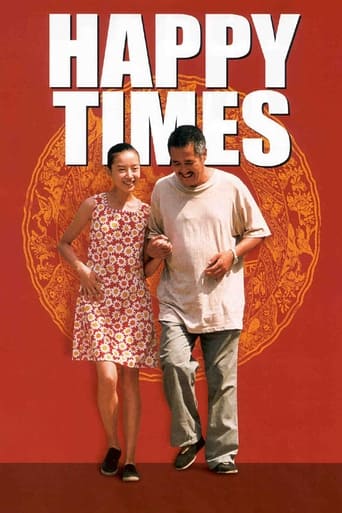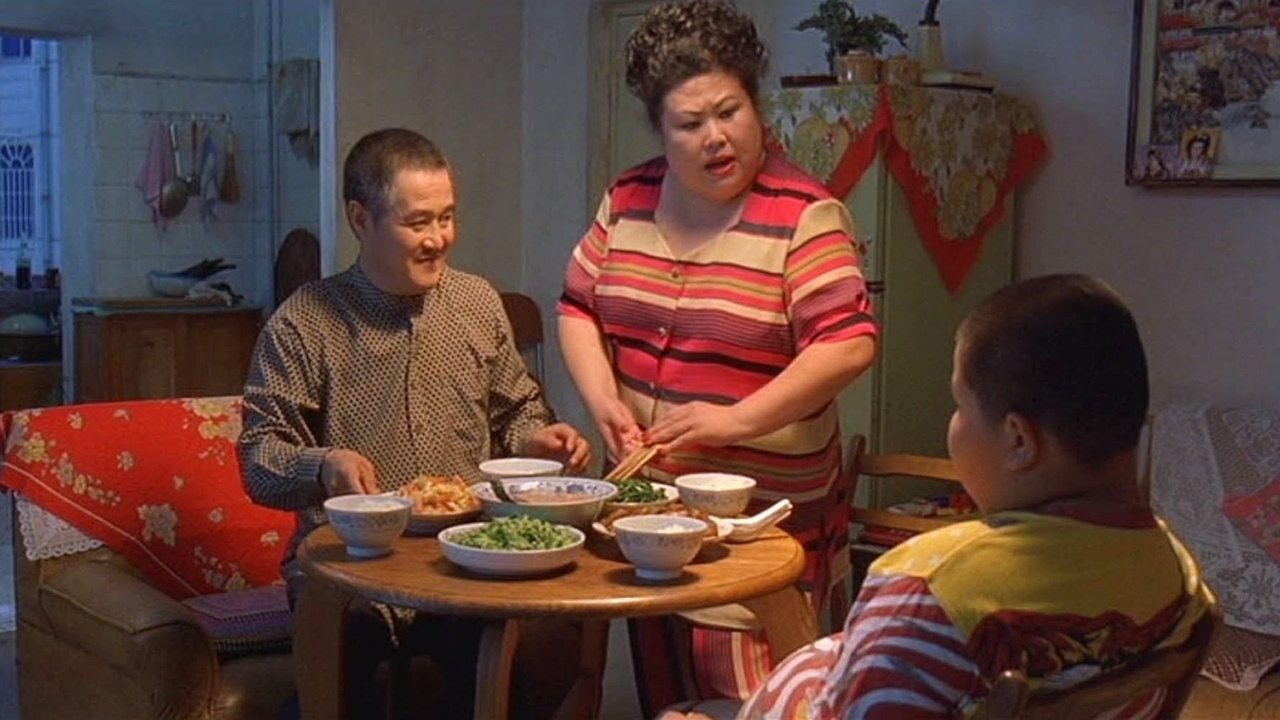tangoviudo
Zhang Yimou is easily the most interesting director in mainland China (he has some competition from Taiwan). "Happy Times" is once again a film that tacitly criticizes China's unprecedented stride into free market economics by depicting the lives of people who are left behind, or who can't find their way. The blind girl Wu is surely a metaphor for China itself, as the end credits make almost explicitly clear - she is followed by the camera as she walks precariously through the crowded city, with construction sites looming ominously in the background. The true stupidity of Roger Ebert is apparent from his dismissal of the film as a crude joke - a blind girl deceived into believing she is a masseuse in the Happy Times Hotel by the well-meaning "manager" Zhao and his reluctant cronies. But Wu is aware of the deception from the beginning, and even knows the bits of paper they give her aren't real money. Yet she goes along with the masquerade because she realizes to what lengths Zhao has gone to for her. That Ebert missed this nuance is typical of him. The true humor of the film lies in Wu's not being taken in by the deception, yet going along with it anyway - the deceivers satisfied she doesn't know, the deceived satisfied that she does. The final minutes of the film, with the tape-recorded voice of Wu expressing her love and thanks to Zhao (who is unable to listen) are bittersweet and captivatingly lovely.
david_k
The story starts with a 50-year-old laid-off Chinese factory worker dating an enormous, twice divorced tubby. Between the fact that there just aren't enough women to go around in China, and the dearth of women that are attracted to shiftless factory workers anywhere, this nasty looking, nasty tempered women seems a good matrimonial prospect to him. To win her affections he claims to be the owner/manager of the Happy Times Hotel, which is in fact, an abandoned bus he rents to adolescents seeking privacy for trysts. The girlfriend's latest husband saddled her with a blind stepdaughter, whom she palms off on our protagonist as masseuse who can work in his hotel.The story becomes endearing when our man takes the 18-year old, it really brings out the best in him. He tells her that she is in a hotel and gets his friends to pretend to be massage customers, giving them his own money to tip her. At first he is clearly being kind so the girl will put in a good word with her stepmother, but very soon we can see his actions are selfless. He gives her his room and tells her it is hotel employees' quarters. He sells his television to get money for tips. When he runs out of money he and his friends give her blank paper, thinking she won't know the difference. All the while, the girl knows what the old man is doing, and plays along so he won't be disappointed. Through the picture, the girl expects her father to return with money to pay for surgery to cure her blindness, but in fact her father has bilked his ex out of money and left them. The old man hopes to raise the girl's spirits by fabricating a letter from her estranged father, but is hospitalized and never has a chance to read it to her. Before knowing that he is hurt, the girl ventures out on her own, leaving a tape recording thanking the man for his kindness. The transformation that the girl goes through is uplifting. When she first left her stepmother's house, she runs into the street, half hoping a car would hit her. At the end, she seeks her fortune on her own, determined to make it. I was pretty afraid for her at the end, venturing out, but freedom is scary sometimes. I really admire her for going.Some people's comments said that they had hoped for a different ending, perhaps with the two ending up in love. That would have been horrible, to think that this girl could aspire to something better than him. He's nice enough, but he really doesn't have much to offer. Another commenter said the movie is a symbol of the Chinese people living under the communist regime. The blind girl symbolizes the supposed blindness of the Chinese people, who know full well what the old man, who symbolized the regime, are doing. The play money supposedly symbolized the false promise of riches by the regime. The girl's going off by herself in the end symbolizes the Chinese people's eventual cut of the regime's cord. I don't buy this interpretation, mainly because the final scene is a real key to this interpretation, and this ending was one that was reshot when early audiences disliked the original ending. Anyway, I'm not sure "Happy Times" is the way I would characterize the relationship of the Chinese people under Communist rule. I usually take movies at face value and don't hunt for symbols, but I thought the girl's blindness symbolized the blind spots that we all grow up with. She refuses to see her father's faults, but in the end she realizes that malefactor that he really is. Finally seeing this is why she can go out on her own, the kind old man played a big part in making her see it. Very uplifting.
Rock Savage
Xingfu Shiguang (2000) or "Happy Times Hotel" is a gem of a film. It has some laugh-out load moments yet is perfectly balanced with tragedy. It reminded me somewhat of Mike Leigh's "All Or Nothing".The acting, as with all films directed by Zhang Yimou, is of the highest caliber. Not one performance can be faulted. The editing and camera work again cannot be faulted. The art direction was perfect. The more I see this director's work the more I feel he is the most talented film director alive today because he continues to produce motion pictures of such a high standard and with such consistency that comparisons are bound to be made with other great artists such as Stanley Kubrick.
ayu1990
I have seen four films by Zhang Yimou and this one was quite impressing to me. What impressed me was that the old man kept on lying to the blind girl called Wu Ying (Jie Dong) and they still kept a great friendship even when she had finally found out that he had been lying from the very beginning.The old man was intent on marrying the blind girl's evil stepmother and didn't get a chance to in the end because she had found out about his deception. I felt sorry for the old man that time because of the way he took it and ended up getting injured by being hit by a large truck.Despite the sad ending, what I enjoyed mostly was the friendship and the fact that the old man and his friends were working hard to please her in the difficult times she had and that she was even pleased to find that fact out as she hadn't gotten much attention before.


 AD
AD

